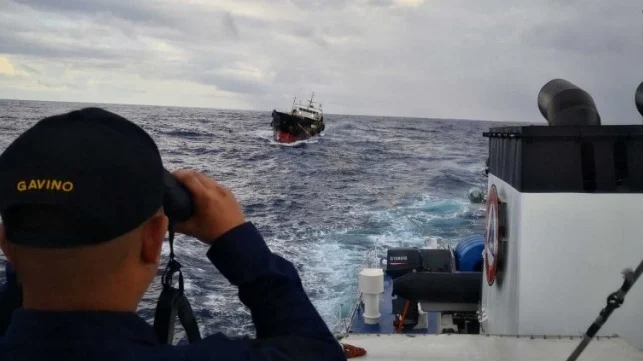TOP VACANCIES of this week for Offshore Fleet (Worldwide)
Full crew – 13 jobs
Master – 22 jobs
1st officer/Chief Mate/Chief Officer – 10 jobs
2nd Officer and 3rd Officer – 14 jobs
1st Engineer/Chief Engineer – 8 jobs
2nd and 3rd Engineer – 23 jobs
ETO and Electrician – 18 jobs
Bosun – 3 jobs
AB and OS – 20 jobs
Motorman/Oiler/Pumpman and Mechanic – 7 jobs
Rigger and Deckhand – 8 jobs
Crane Operator and Engineer – 9 jobs
Supervisor and Surveyor – 5 jobs
Chief Cook and Cook – 13 jobs
Steward – 11 jobs
Medic – 3 jobs
Follow the link, choose your position, and contact information for vacancies will be available to you
https://bit.ly/3ybtPE3

13 Things Sailors Must Keep in Mind About Their Sea Job Contract

1. Written contract – Get your Own Copy
A written contract is more than necessary before you join a sea job. Verbal agreement or vocal mutual consent can be risky, even if working with acquaintances. Always make sure you own your personal copy of a written contract for all future references.
2. Know what you are signing in for
Work at sea can be just as exhausting as it can be thrilling. So it is important you go through your sea contract thoroughly before signing it. Your signature is your consent for everything mentioned in the contract and waives your right for any reverting in the future. Hence, read carefully. Always!
3. Show faith in work, not in a contract
Signing a blank contract in name of faith in the other party can be a fatal decision. NEVER sign a blank contract, even if it is just a blank paper. Your signature makes it appropriate for any legitimate purposes.
4. Consult guidelines
Clauses of a sea contract should be assigned in accordance with guidelines of the Collective Bargaining Agreement (CBA) in shipping, to be precise. This agreement grants you rights in a sea job like the right to form trade unions which are counted as basic human rights in any job.
Hence, your contract cannot debar you from such rights example the right to consult or form trade unions, wage scales, etc. It is important to cross-check your sea contract with CBA.
5. Mutual consent
When you sign a contract, make sure it does not grant rights for any alterations in any of the aspects of working on the sea to one party alone. Your contract should ensure that any such changes in a contract can only be made through mutual consent, which should be suitably notified.
6. Time duration
Check that the work duration of your sea job is clearly mentioned in your contract. Any clause suggesting a chance for change in the duration, or extension without consultation should be flagged and appropriately considered before you sign the contract. Also, make sure your contract mentions compensation for premature termination of a contract, conditions for the extension of the contract, and penalty for quitting the job before contract maturity.
7. Working conditions
The contract should clearly mention the working conditions of a sailor job, especially the basic amenities. Working hours, working days, and paid leaves should be clearly and separately mentioned in the contract. The absence of these clauses or ambiguity in their nature should be an alert sign.
These conditions are set by the International Labor Organization. Make sure your contract adheres to the minimum standards set by ILO. For example, ILO states that no sailor can be made to work on a ship for more than 48 hours per week with a minimum paid leaves of 2.5 days per month.
8. Payscale
A sailor’s job should adhere to pay scale standards set by ILO. And this pay scale should be clearly mentioned in the contract. Make sure there is no clause in your contract stating any possibility of change in pay scale without your consent or prior notice.
Also, ILO sets standards for compensation for overtime which should be at least 1.25X the normal pay grade. It is important your contract mentions compensation for the overtime you’d do while working on a ship.
9. Compensation for damages
A contract at sea should clearly state clauses for compensation of any damage during the time on a ship. Loss of property, physical injury, mental or psychological trauma, and death (compensation to the mentioned beneficiary) should be provided for due compensation.
10. Fine print and conditions applied
Check the sea contract for any fine print clauses that may be mentioned. Withholding salary, unsuitable working conditions or waiver of any of the rights mentioned as basic human rights under CBA are unacceptable clauses. Do not sign a contract if it mentions any such clauses, especially any scope of change in the future without notification.
11. Deeming responsible
Make sure the contract does not unknowingly make you liable for being held responsible for any kind of damages that may occur during your sea job. Loss of vessel, losses incurred due to such circumstance, pirate attacks, ship safety, etc are unfavourable conditions that a sailor cannot be held responsible for unless mentioned in his contract.
You cannot be deemed responsible for the same unless the contract has been signed by you in full knowledge.
12. International guidelines and not of a private region
Your contract should be made in accordance with the guidelines of international authorities. A clause mentioning a particular region as the place of jurisdiction for the contract at sea should be considered.
13. Discretion
Keep in mind that a contract you sign legally binds you in all the clauses mentioned in it. Hence, always make sure you read it carefully and consider all the clauses and their implications before you sign it.
Work at sea is a fun experience, especially for those who love it. But it is in your hands to make sure that you receive due perks for the same. All sea job contracts should be thoroughly read and then only signed.

















